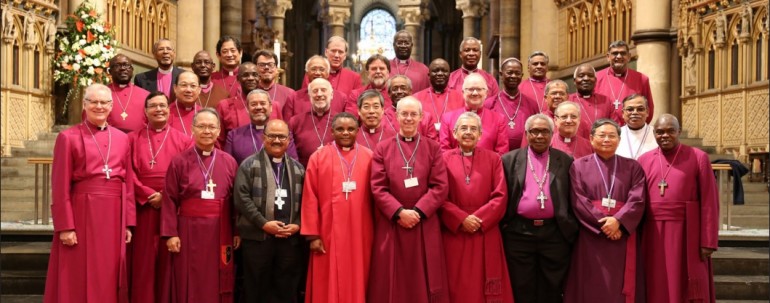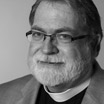I want to commend the statement issued by Archbishop Mouneer Anis, Presiding Bishop of Jerusalem and the Middle East, “Does the Primates meeting have any authority?”. Archbishop Mouneer issues a robust defense of the authority of the Primates’ meeting to oversee the relationships between Anglican provinces with regards to doctrinal, moral and pastoral issues. Based on resolutions from The Lambeth Conference of Bishops in 1978, 1988 and 1998, Communiques from the meetings of the Primates in 2003, 2005 and 2007, actions they requested to discipline The Episcopal Church (TEC) in 2005 implemented by Anglican Consultative Council-13 (2005), and the Windsor Report, he rightly concludes that the Primates, meeting together, exercise an “enhanced responsibility” for doctrine, discipline and order among the Churches of the Anglican Communion.
I couldn’t agree more that the “enhanced responsibility of the Primates” includes guidance on the limits of “Anglican diversity” over matters of doctrine, discipline and order among the Churches of the Anglican Communion. I couldn’t agree more that “good order” requires the upcoming meeting of the Anglican Consultative Council (ACC-16) to “implement the disciplinary measure decided by the [January] 2016 Primates’ Meeting.”
However, Primatial authority does NOT depend on the Archbishop of Canterbury calling the Primates together. They are not impotent if he fails to call them together, as former Archbishop of Canterbury Rowan Williams effectively failed to do in 2011 when 15 Primates absented themselves from the gathering in Dublin (as Archbishop Mouneer observes). Nor are the Primates impotent to act when the Archbishop of Canterbury undermines their decisions, as Archbishop Rowan Williams did following the 2007 meeting in Dar es Salaam, Tanzania.
The Communion’s Primates are NOT impotent when the Archbishop of Canterbury fails to respond publicly to the Anglican Consultative Council’s public repudiation of Primatial authority.What do the Primates do when the Archbishop of Canterbury remains silent in the face of such a public repudiation of their “enhanced responsibility”? Do they simply wring their hands? Must they remain silent until he speaks—IF he ever decides to speak? Of course not. That is why the Primates of the three largest Churches in the Anglican Communion–Nigeria, Kenya and Uganda—have spoken so clearly. They understand that their Primatial authority or “enhanced responsibility” to guard the faith and order of the Churches of the Anglican Communion derives from their office as “Principal Bishops” of their Churches, and not from Canterbury. Primates can and do act whether the Archbishop of Canterbury calls them together or not, whether he speaks up for them and their collegial mind and decision making—or not, as Archbishop Welby has chosen to do.
The enhanced responsibility of the Primates to guard the faith and order of the Churches of the Anglican Communion is more than moral and persuasive. It is an ancient principle in Church law that bishops—and primates as “principal bishops”—have a special responsibility to uphold the doctrine, discipline and order of the Churches over which they preside. They exercise this function as bishops in Synod in their teaching and governing role with respect to doctrine, liturgy and ecclesiastical order. The authority of the Primates in guarding the faith and order of the “Communion of Anglican Churches” is inherent in their office, quite apart from the role and authority of the Archbishop of Canterbury. The Archbishop of Canterbury is simply primus inter pares among other Primates.
At the national or provincial role, we see this in the very Mother Church of the Anglican Communion. Article 7 of the Church of England General Synod’s constitution preserves the ancient and catholic role of bishops as guardians of the faith and order of the Church and its liturgy.[1] Synod may only consider a provision which touches the doctrinal formula, the services and ceremonies of the Church, the administration of the sacraments or sacred rites thereof, or the identity of the Church “on terms provided by the house of Bishops and not otherwise.”[2] In other words, any proposed changes in doctrine or liturgy must first be referred to the House of Bishops and can only be submitted for final approval in terms proposed by the bishops.
We also see this within such representative Global South Anglican Churches as the General Synods of South East Asia and Nigeria. In their constitutions and canons, both recognize that bishops have a special authority, duty and responsibility to preserve the truth of the doctrine of the Church, the purity of its life and the worthiness of its worship.[3] In both Churches the role of the Bishop as guardian of faith and order is rooted in the New Testament “distribution of gifts” according to the Holy Spirit.[4] In the preface to its constitution, from the Statement by the Archbishop of Canterbury in the original preface (1973),[5] the Diocese of Singapore explains the catholic and apostolic reasons for the unique role of bishops:
“The Priests and the laity bring the fruits of the experience gained in parish, profession or home into the consultations and discussions of the Synod. Their outlook may often be limited by their experience. It needs to be balanced by an outlook gained from the history of other ages or the examples of other parts of the Church of today. Although much of the business of the synod will be homely matter, unconnected with great principles or doctrines, any important question about the Church’s action may involve an issue of doctrine or of moral principle, on which the Diocesan Bishop must express, and if necessary insist on the teaching of the universal Church.” [6] (Emphasis added).
In fact, to the degree that Anglicans share a “common law” within their Communion of Churches, this ancient and catholic principle of the teaching and governing authority inherent in the office of the bishop (and the Primate as “principal Bishop”) is spelled out in thePrinciples of Canon Law Common to the Churches of the Anglican Communion (London: Anglican Communion Office, 2008) For examples, see Principles 37.4: In Diocesan episcopal ministry, “the bishop must teach, uphold and safeguard the faith and doctrine of the church,” 48.3: In the presentation of doctrine, bishops have the special responsibility to “teach the faith, to state publicly the doctrine of the church, and expound their application to the people and issues of the age,” and 56.7-8 and 60.1: In liturgical administration, “the bishop has the authority to order liturgy, liturgical practice and worship within the diocese.”
If there is anything close to unanimous agreement within the Anglican ius commune (common law) it is that bishops have a special responsibility to guard the faith and order of the Church at every possible level. And what better body to guard the faith and order at the highest level of governance within the Anglican Communion than those bishops who exercise archiepiscopal and metro political power- the Primates themselves.
All the way back in 2001, then Archbishops Drexel Gomez (West Indies) and Maurice Sinclair (Southern Cone) imagined what such “enhanced responsibility” would look like. In To Mend the Net (Ekklesia, 2001) they outlined how such a Primatial Council could take order of the controversies dividing the Anglican Communion. Their outline included juridical authority (not just moral) to request innovators like TEC and the Anglican Church of Canada to refrain from further “facts on the ground” in the face of objections from other provinces, and authority of such a Primates Council to issue “Godly admonitions” to innovating provinces, reduce continuing innovating provinces to observer status within the Communion, re-order and even provide for the formation of a replacement province for provinces that continue to innovate and willfully ignore such Godly admonitions.[7]
This is not a radical departure from Anglican norms. In fact, it is merely a logical extension of existing Principles of Canon Law at work at every other level of church governance.
And what about the role of the Archbishop of Canterbury? Does it all hinge on his leadership (or lack thereof)? On the eve of GAFCON 2013, even the Archbishop of Canterbury recognized that it is time to heed the call for the Primates themselves to elect a Chair—a practice that itself would be more conciliar and less “colonial.”[8]
The sad fact is that the silence of the Archbishop of Canterbury in the face of public repudiation of Primatial Authority has already brought back the distrust among the Primates which was already there before they met in January of this year. As I observed last week, the Primates must be wondering why they even came together in January at Archbishop Welby’s request if he is now unable to defend them. And as Archbishop Mouneer notes, that is the source of our impaired Communion. It is a great pity that the source of impaired communion lies in great part in the lack of leadership by Canterbury himself.
Thank God for the Primates of Nigeria, Uganda and Kenya! Thank God for their willingness to exercise the Godly teaching and governing authority inherent in their office. The wounds to the Communion are not incurable. Archbishops Gomez and Sinclair’s 2001 proposal to remedy the current “deficits of authority” within the Anglican Communion with a Primatial Council awaits fulfillment. Perhaps a Primatial Council in Synod? Could this be on the horizon for Biblically faithful Primates in GAFCON and the Global South to enact?
The Rev. Canon Phil Ashey is President & CEO of the American Anglican Council.



